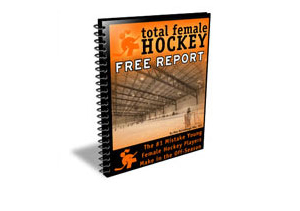The 10,000 Hour Rule In Girls Hockey
How young is too young for players to start getting serious about playing
at the elite level of women’s hockey? Is 15 too young? How about 10?
7 years old is definitely too young, isn’t it? If an aspiring player’s goal
is to play in the Olympics, it might not be.
When it comes to achieving “mastery” in your chosen sport – defined as
being a world-class player – experts say you need to spend 10,000 hours
perfecting your craft. Now 10,000 hours is a lot of time especially when you
consider that most girls’ hockey players are only on the ice for an average
of 7 hours a week.
So how would a young player looking to make it to the highest levels
of hockey be able to accumulate enough hours to reach the top of her sport?
Here’s how those 10,000 hours might breakdown
(assuming that she is training all year around):
If she spent 10 hours per week training for 50 weeks of the year,
she would collect 500 hours of training time per year. At that rate,
it would take her 20 years to reach the “mastery” level. Considering
many girls hockey players don’t start playing until they are 7 or 8,
that might just be too little, too late.
If she spent 15 hours per week training for 50 weeks of the year,
she would collect 750 hours of training time per year. At that rate,
it would only take her 15 years to reach the “mastery” level.
So she doesn’t need to start quite as early, but it is still a long time.
If she spent 20 hours per week training for 50 weeks of the year,
she would collect 1000 hours of training time per year. At that rate,
it would only take her 10 years to reach the “mastery” level.
It would be 10 years of intense hard work, but it could be done.
Since most girls hockey players decide that they want to get to the
elite level around the age of 14 or 15, it is realistic that starting this
intensity of training schedule could get you to your goal by the time
you were 24 or 25, which is the average age of the women’s national
team members in the US and Canada.
The reality is that whether you start at the age of 5 or 15, it’s going to be
pretty hard to collect all these training hours only through on-ice training.
In fact, it’s virtually impossible (and highly discouraged) for younger players
to be on the ice for 3 hours every day of the week. By the time girls get
to college hockey, 3 or 4 hours of training per day is pretty standard.
But that doesn’t start until you are 17 or 18 years old – when you are
physically and mentally ready for that level of focus and intensity of training.
So how can aspiring players start to accumulate the hours they need to
achieve mastery in women’s hockey?
Think beyond ice time.
The hours girls spend training off the ice count too, and might even be more
important for younger players who don’t have access to hours of ice every day
and haven’t built up the foundation of strength and speed necessary to play
high-level hockey yet. On-ice ability alone is not enough to get girls to the elite level.
It’s what players do off the ice that separates the best from the rest.
Working out, shooting pucks, working on new stickhandling moves, becoming a
better all-around athlete – those all count towards your 10,000 hours.
By building a foundation for elite performance off the ice at an early age,
players give themselves the opportunity to be great on the ice years later.
If they wait until they are 16 or 17 to start, they might just run out of time.
So if you want to be world-class, and you are ready to make a dent in those
10,000 hours, start working as hard off the ice as you do on the ice.
Work Hard. Dream BIG.
Your friend and coach,
Kim
PS: It’s almost August which means training camp and tryouts are just
around the corner. If you haven’t been training off the ice this summer,
there is still time to get into good shape before the season starts. I’ve
created the GAME SHAPE FAST program to help you get faster,
stronger and more fit in just 4 short weeks. You can check it out here:
https://totalfemalehockey.com/game-shape/
Kim McCullough, MSc, YCS
Director & Founder, Total Female Hockey
www.TotalFemaleHockey.com

